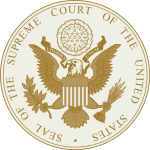Correlation Between Number of Questions the Justices Ask and Losing Your United States Supreme Court Case
 The New York Times has published a story about some studies showing a strong correlation between the number of questions the Supreme Court justices ask a particular litigant during oral argument and an increased likelihood that that side will lose. In the words of the attorney who did some of the first work on this question while she was a still a law student,
The New York Times has published a story about some studies showing a strong correlation between the number of questions the Supreme Court justices ask a particular litigant during oral argument and an increased likelihood that that side will lose. In the words of the attorney who did some of the first work on this question while she was a still a law student,
“The bottom line, as simple as it sounds,” said the student, Sarah Levien Shullman, who is now a litigation associate at a law firm in Florida, “is that the party that gets the most questions is likely to lose.”
Shullman only studied ten cases, but, the article reports, Chief Justice Roberts confirmed the result in his own, larger study while he was a circuit court judge.
A recent, much more thorough study, accepted for publication in the Washington University Journal of Law and Policy, seems to prove the correlation exists. From the abstract,
This paper tests whether Supreme Court justices tip their hands at oral arguments. Specifically, we test whether, when justices ask more questions of one side, that side is more likely to lose their case. The findings support the theory; namely, when justices ask more questions of the petitioner’s attorney the Court is significantly less likely to reverse the lower court decision.
The NYT remarks that Chief Justice Roberts “sounded both fascinated and a little deflated by the results of his experiment. ‘The secret to successful advocacy,’ he said playfully, ‘is simply to get the court to ask your opponent more questions.'”
The result seems obvious. It is human nature, at least among lawyers, to want to interrupt and ask questions of someone you disagree with, especially if the person’s answers are not satisfactory. In other words, the side that has a sound, convincing answer for every question has created a better argument.
Now, if only a study could show how to have a sound, convincing answer for every question in every argument. That would be a real secret to successful advocacy.

